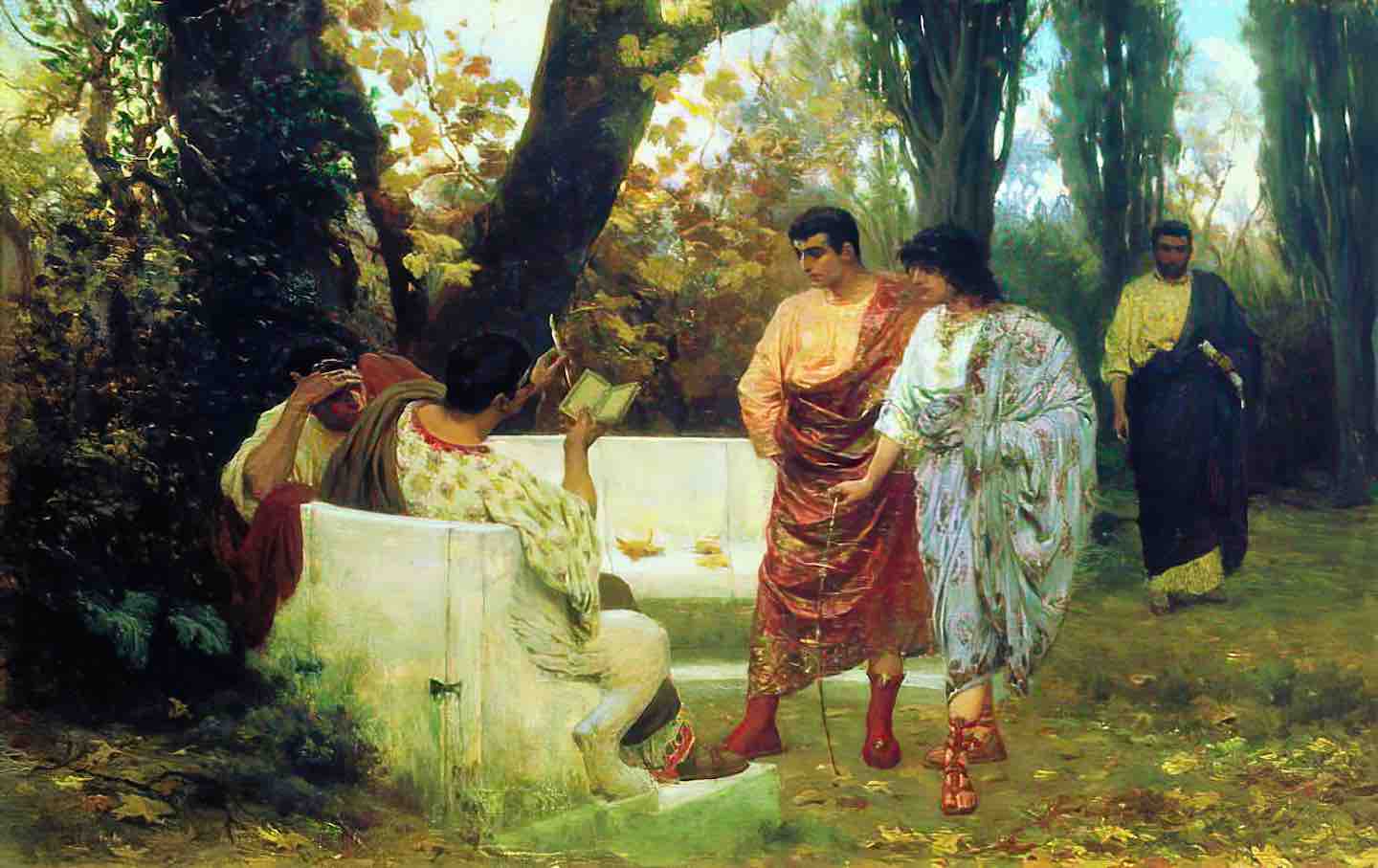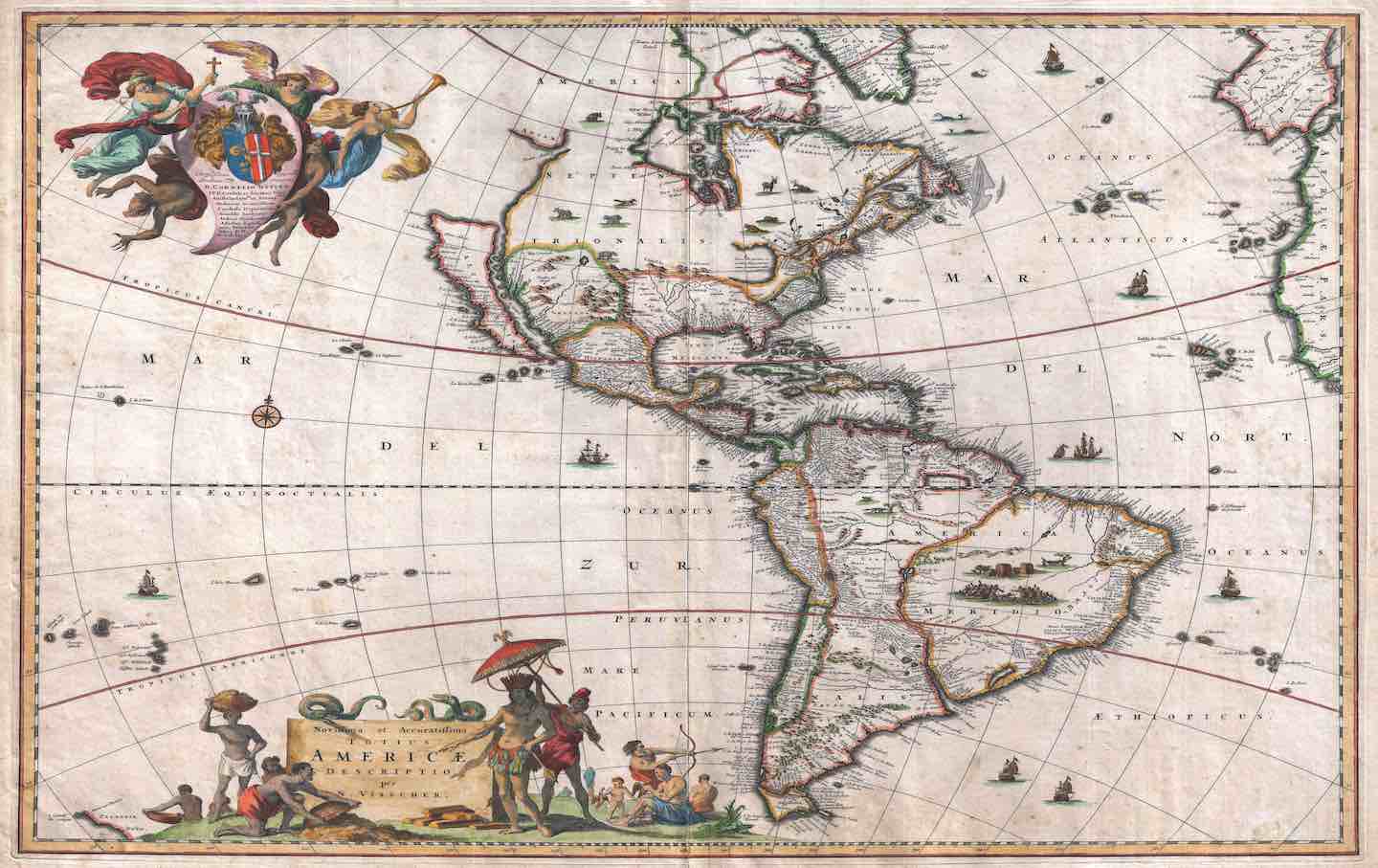The Age-Old Struggle of Translating Catullus
A crisp new rendering of the Roman poet’s poems underlines how difficult it is to fully relate all his complexities and contradictions.

Stefan Bakałowicz’s Roman poet Catullus reading to his friends (1885).
(Wikimedia Commons)
Everything we know about Catullus has come to scholars by happenstance. His slim collection of poems, composed in the mid–first century BC, was discovered by chance, transcribed on a single manuscript in fair Verona at the beginning of the 1300s. By the end of the century, the manuscript was lost again, although two copies had been made, which ensured the survival of the poems. It would take almost another five centuries for Catullus to reach readers in English; although poets like Lovelace and Cowley nibbled at one or two poems, the first complete English translation didn’t appear until a physician, John Nott, produced one in 1795.
Books in review
Catullus: Selected Poems
Buy this bookSince then, Catullus has been subject to waves of interpretation and reinvention. There’s the Catullus of the Romantics and the Victorians, like Swinburne and Tennyson, who were intoxicated by his lyricism and anguished love poetry, while tiptoeing around his salaciousness. Then there’s the Catullus of the modernists, who reveled in his encyclopedic breadth and linguistic pyrotechnics. Currently, it seems like we are in the middle of another Catullan “moment,” with a string of inventive translations and adaptations, mainly by female writers, undercutting and complicating the poet’s chauvinistic braggadocio. Most recently, Anna Jackson, Isobel Williams, and Roz Kaveney have mined Catullus to create brilliant, intense explorations of gender and the dynamics of sexual power. Stephen Mitchell’s crisp new translation manages to encapsulate many of these aspects but follows a more conservative path, homing in on the rhythm and diction—“the music”—of Catullus’s poetics.
Catullus’s enduring popularity can be explained, in part, by the apparent accessibility of his poetry: simple, confessional, often obscene. It can seem that he speaks directly to us, or that we can retrofit him, without much resistance, to meet today’s concerns. But Catullus resists straightforward categorization, and the real difficulty—and attraction—in translating him is not so much the formal or linguistic problems, but rather capturing the many different modes that the poet adopts: not only the smut alongside the love poetry, but also the mythologically erudite and intensely self-reflexive, as well as the downright mundane. Translating Catullus is always a flirtation with defeat. Ezra Pound confidently declared that “no one has succeeded in translating Catullus into English,” a claim he based on personal experience: “I have failed forty times, so I do know the matter.”
If Catullus can appear new to modern readers, then this “newness” is not just a retrospective attribution, but part of how Catullus was seen in his own day. He was writing at an evolutionary moment in Roman poetry, and his poems introduce us to a circle of friends who shared similar tastes and wrote poetry with each other, for each other, and quite often against each other. Cicero sneered at Catullus and his fellow poets, labeling them “Neoterics”—the New Poets—and criticizing their penchant for linguistic experimentalism, recondite references, and an almost art-for-art’s-sake approach to literature. Their interests were in stark contrast to Cicero’s own stuffy conservatism, which saw poetry as a vehicle for moral instruction and patriotic edification.
Although Cicero deemed the New Poets hopelessly pretentious and avant-garde, they in fact took their inspiration from the past, from Hellenistic poets of the third century BC, where an information boom (it’s helpful to think of the creation of the Library of Alexandria as a paradigm shift equivalent to the invention of Google) had encouraged interest in intense bookishness and technical polish, tethered to simplicity and concision and a disdain for prolix poems. Long hours, and little to show for it, was the name of the game. Better to sit on a poem for nine years, says Catullus, honing lapidary, low-key forms like epigram and lyric, than to churn out distended and cheap imitations of Homeric epic.
The opening poem of Catullus’s collection gives us a good sense of his poetic program. Mitchell renders the first lines crisply:
Whom to dedicate this slim book of verse to,
Just now polished and inked with my revisions?
You, Cornelius: since you used to think that
These light things I had scribbled had some value.
Nothing fancy here, Catullus tells us—just a little chapbook of nugatory and inconsequential verse, despite the polish and revision that the poet has invested in it. Mitchell has a terrific ear and, from the outset, is alert to the complex metrics that Catullus employs, particularly the hendecasyllable (an 11-syllable line), which makes up some 57 poems, including this one.
Tennyson’s “Hendecasyllabics,” itself a nod to Catullus, hovers in the background, but as Mitchell acknowledges, there is more of the lighter, conversational lilt of Robert Frost here (the poet who first led Mitchell to Catullus, as he tells us in the introduction). Mitchell’s metrical capabilities are consummate and owe much to New Formalism—the book is dedicated to the memory of Richard Wilbur, and Dana Gioia is the first to be mentioned in the acknowledgments.
But fidelity to meter generally requires minor sacrifice. In the Latin, Catullus’s book is not just a “slim book of verse,” but also “elegant” (lepidum) and “new” (novum)—key terms for Catullus’s poetics, which here go up in smoke, as does his strictly material reference to the pumice stone (pumex, which Mitchell elides comfortably enough into “polished”), a tool that can smooth out edges and erase errors but is also used to soften skin, which introduces a whiff of the sexy and subversively effeminate. The struggle with translating Catullus is to find ways of conveying the full range of meanings that he manages to cram in, without losing his economy of expression or completely unraveling the complex knot of his language games. While Mitchell gets it just right more than once, we are often confronted with a slightly attenuated, two-dimensional Catullus.
For all this poetic self-consciousness and obsession with craft, however, Catullus is, at heart, a society poet. His poems are busy and thronging, and to read him is to encounter a kaleidoscope of social relations. The names of some 40 contemporaries occupy his volume, even if it’s usually impossible to pin them down with any certainty. Catullus lived in interesting times. He was born in Verona, in the province of Cisalpine Gaul, in the 80s BC, and wrote poetry in the 60s and 50s, a period in which Rome was not only spiraling toward political chaos and civil war but also descending into what Cicero might lament as a state of moral relativism, away from the traditional, binding mos maiorum—“the custom of our ancestors.” Instead, like Restoration England, the essential commodity in Catullus’s dandified circle was wit, elegance, and charm: your ability to deploy a put-down, a backhanded compliment, or a clever aphorism upon command. Catullus’s poems orbit around key terms like facetiae (“drollery”), lusus (“mockery”), and lepos (“charm”). He’s always tickled to meet someone “full of charm,” always ready to excoriate those who suffer a deficit.
While Catullus can be steadfast and effusive toward his friends, what he excels at is insult and invective. If Tennyson thought Catullus “the most tender of poets,” Harold Nicolson was less convinced: “It passes my comprehension why Tennyson could have called him ‘tender.’ He is vindictive, venomous, and full of obscene malice.” Yet obscenity doesn’t quite cut it. Catullus thrives on shock value, and a large chunk of his poetry is definitively transgressive, covering a wide field of abusive content, including body-shaming, misogyny, xenophobia, accusations of incest, and quite a few threats of sexual violence.
Mitchell avoids translating the most vehement of these (Poem 16, O curious reader) but gives satisfactory air time to others, particularly the ones aimed at Mamurra, the unscrupulous and reaching chief henchman of Julius Caesar, whom Catullus constantly refers to by the pseudonym Mentula (“prick”). In one poem—which Mitchell calls Catullus’s “bravest and most political poem”—Caesar himself comes under fire: “Unless you’re shameless, ravenous, foolhardy / How can you stand to look on while Mamurra / Plunders far-off Britain and Provence? / You faggot, Caesar, can you bear to watch this?”
According to the imperial biographer Suetonius, Catullus’s attacks left permanent scars on Caesar, although Suetonius also says that Catullus eventually apologized, securing him a dinner invitation from Caesar that very same day. This perhaps points more toward Rome’s thriving diss culture than to any abundance of tolerance on Caesar’s part. But as the Mamurra poems illustrate, Catullus’s insults revolve predominantly around sexual explicitness, which throws up constant obstacles for the translator, particularly when they concern gender expectations and same-sex relations.
Masculinity is a constant point of contention, and a constituent threat to the Roman elite male was not so much the accusation of “homosexuality” but sexual passivity, and whether or not you allowed yourself to be penetrated. Homophobic slurs, like calling Caesar a “faggot”—Mitchell’s gloss for cinaedus—go some of the way, but the Latin encapsulates so much more: The cinaedus was in essence an ass-shaking deviant, committed to subversive and hedonistic living, as Plato tells us in the Gorgias. The impossibility of landing on a directly equivalent contemporary term—Guy Lee goes for “poof,” Peter Green for “fag”—points to both the gulf between past and present, but also to the various ways, however imperfect, in which translation can attempt to bridge it. Mitchell’s parallel text, along with generous notes, particularly on these matters, help us make our own minds up regarding the appropriateness of such terms. And at any rate, as Mitchell astutely points out in the introduction, word choice is almost superfluous: “The contempt is the meaning.”
More difficult is the threat of rape, which features heavily in Catullus’s poems: He issues such threats to people, but more often than not imagines himself on the receiving end of such assaults. In one poem, Catullus accuses Gaius Memmius, a governor in Turkey whom Catullus served as an aide, of enriching himself while cheating the poet and his friends out of any profit. Things get ugly, quickly: “You prick, Memmius—you just fucked me over / stuck yourself in my mouth and coolly climaxed.” No matter how you cut it, it’s a graphic image, but Mitchell, generally restrained, warps Catullus’s economic expression in the Latin (lentus irrumasti) into quite a, well, mouthful—again, ostensibly for the sake of metrical fidelity. But there’s also a good argument for making the explicit even more so, an attempt to match the shock effect that Catullus desires. Beneath all choices in translation are the unavoidable ethical questions: Do we isolate, denounce, or explain the sexual violence? Does Catullus “speak to us” here, and if he does, who are “we”? Is this really “great poetry”?
But what truly startles here is Catullus’s willingness to present himself as the passive victim of such an attack, and to translate his social, economic, and political insecurities into terms of male-on-male sexual violence. Catullus constantly alternates between the alpha male, all priapic swagger and hypermasculine saber-rattling, threatening to stick his you-know-what you-know-where, and the aggrieved party, the young, vulnerable provincial from Gallic Verona, susceptible to pressures and attacks from his superiors. Each stance undermines the other, and forces us to make choices about where to place Catullus in his own social world.
Of course, this isn’t the Catullus that budding Latinists cut their teeth on. Most readers will associate Catullus with his love poems dedicated to Lesbia. Catullus introduces her into his poetry early, and the unhappy and increasingly one-sided relationship forms the book’s dramatic core and narrative arc—a quite radical move in Latin poetry that the elegists of the next generation, like Propertius and Ovid, would develop, as would Petrarch and the Elizabethans centuries later. For Romans, this was a particularly subversive ploy. When Catullus says to Lesbia, “Let us live and let us love,” the idea that life should be spent on love, rather than on business, politics, or war, completely undercuts the expectations of a Roman male. By making love and not war, Catullus emerges as something of a countercultural hero, and there’s a temptation to read him as “a rebel and a radical,” as Frank Copley, at the beginning of the swinging ’60s, did.
Who was Lesbia? Huge amounts of energy have been expended on discovering the true identity behind the pseudonym, an unavoidable reference to Sappho, the female poet from Lesbos. The woman in question was almost certainly Clodia, from an ancient aristocratic family and the wife of the politician Q. Caecilius Metellus Celer, whom Clodia was rumored to have poisoned in 59 BC. Cicero, in his speech “In Defense of Caelius,” paints her as “an impudent and promiscuous whore.” Behind the misogynistic rumor-mongering and vilification, what we can make out of Clodia is a highborn and headstrong woman quite capable of walking all over Catullus, her social inferior. More often than not, we get an image of a deep power imbalance: Lesbia is a “goddess,” and Catullus her slave. Like his performance of vulnerability in other poems, this subservience and disruption of gender roles drastically undercuts the idea of the impervious, all-powerful Roman male.
There is no chronological order to the Lesbia poems, nor do they constitute a self-contained “cycle.” The poems interlock with the rest of the collection, and we get the idea of Catullus obsessively returning to pick over the pieces of his love affair with Lesbia. These poems are intensely private, almost pathological in their self-scrutiny. Some are indulgent in their sensuality and physicality—thousands of kisses and love bites. Others are extraordinarily deadpan, employing language that Catullus pilfers from the world of elite Roman homosociality: reciprocity, favor, and sacred friendship.
Popular
“swipe left below to view more authors”Swipe →While Mitchell is generally pitch-perfect on the former, he’s not always so alert to the latter. Take Poem 87:
No woman can ever say that she has been loved as deeply
as you, my Lesbia, used to be loved by me.
No man has ever respected a vow with greater devotion
than I have always shown in my love for you.
Mitchell captures its awkward symmetry well, but also steers it in the direction of a more familiar love poem, twisting Catullus’s words into the vows and devotions we might expect from two lovers. In the original Latin, however, Catullus’s love language is a ponderous, clunking legalese, comparing his feelings to a contract or treaty (foedus) established with the sort of fidelity (fides) usually reserved for two male friends. The last time we meet Lesbia, Catullus hopes for “the unbreakable bond of this our sacred friendship”—a radical depiction of romantic love between a woman and a man as an intellectually and socially equal friendship (amicitia), a move not seriously returned to until perhaps Jane Austen.
Other erotic language games and innuendo are at play throughout the Lesbia poems, and in other poems we might loosely file under “love.” There’s a long-running debate as to whether Catullus’s dirge for Lesbia’s dead sparrow is also a double entendre for Catullus’s impotent penis, and he also coins a number of erotic words that call for special ingenuity on the part of the translator. Basiationes, or osculationes, are not quite “kisses,” as Mitchell has it, but imply a hyperbolic, humorous, almost unreasonable degree of kisses closer to a “make-out session.” Similarly so for fututiones. Other translators have had their fun here: see Guy Lee’s “fuctions,” Jane Wilson Joyce’s “fornifuckations,” Peter Green’s “fuckfests,” or Isobel Williams’s “fucktuations.” Mitchell settles for a simple, traditional “fuck.”
Shortly after the discovery of Catullus’s manuscript in the 14th century, Benvenuto Campesani, a poet from Vicenza, wrote a short Latin poem as a preface for new editions, enjoining the reader to “celebrate your Catullus.” The question that lingers while reading Mitchell’s translation is precisely that: Who is Mitchell’s Catullus? Mitchell thrives on rising to the formal challenges that Catullus’s poetry offers up, and the result is a razor-sharp translation on a formal level. But beyond this, it’s not entirely clear.
This uncertainty is brought about, in part, by the volume’s abridged nature: Mitchell offers less than half of Catullus’s already scanty offering of poetry. Volumes of selected poems always risk emphasizing one aspect of a writer over another. This in itself is certainly not a problem—selected volumes can be, and often are, extremely effective and inventive in their purpose. But the selections should reveal something. Mitchell’s selection of poems offers a good range, but it also treads very familiar “greatest hits” territory. His reasoning for the selections also leaves the reader feeling a little duped: “I simply chose the poems that gave me most pleasure—the ones I thought were best,” he writes. This is fair enough, but it would be helpful to know what the criteria for “pleasure” are, particularly in a poet where the definition of pleasure is so constantly up for grabs. The complexities and contradictions that make Catullus such a difficult, and attractive, poet have been slightly muted in a translation that delights in its polish and refinement.
Correction: A previous version of this review incorrectly listed a year as AD. This has been corrected.
Hold the powerful to account by supporting The Nation
The chaos and cruelty of the Trump administration reaches new lows each week.
Trump’s catastrophic “Liberation Day” has wreaked havoc on the world economy and set up yet another constitutional crisis at home. Plainclothes officers continue to abduct university students off the streets. So-called “enemy aliens” are flown abroad to a mega prison against the orders of the courts. And Signalgate promises to be the first of many incompetence scandals that expose the brutal violence at the core of the American empire.
At a time when elite universities, powerful law firms, and influential media outlets are capitulating to Trump’s intimidation, The Nation is more determined than ever before to hold the powerful to account.
In just the last month, we’ve published reporting on how Trump outsources his mass deportation agenda to other countries, exposed the administration’s appeal to obscure laws to carry out its repressive agenda, and amplified the voices of brave student activists targeted by universities.
We also continue to tell the stories of those who fight back against Trump and Musk, whether on the streets in growing protest movements, in town halls across the country, or in critical state elections—like Wisconsin’s recent state Supreme Court race—that provide a model for resisting Trumpism and prove that Musk can’t buy our democracy.
This is the journalism that matters in 2025. But we can’t do this without you. As a reader-supported publication, we rely on the support of generous donors. Please, help make our essential independent journalism possible with a donation today.
In solidarity,
The Editors
The Nation








